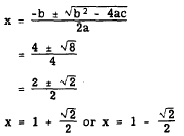|
Irrational Roots
If the discriminant is not a perfect square,
the radical cannot be removed and the roots
are irrational.
Consider the equation
2x2 - 4x + 1 = 0
in which
a = 2, b = -4, and c = 1.
The discriminant is

This discriminant is positive and not a perfect
square. Thus the roots are real, unequal, and
irrational.
To check the correctness of this information,
we derive the roots by means of the formula.
Thus,

This verifies the conclusions reached in
evaluating the discriminant. When the discriminant is a positive number, not a perfect
square, it is useless to attempt to factor the
trinomial. The formula is needed to find the
roots. They will be real, unequal, and irrational.
SUMMARY
The foregoing information concerning the
discriminant may be summed up in the follow-
ing four rules:
1. If b2- 4ac is a perfect square or zero,
the roots are rational; otherwise they are
irrational.
2. If b2- 4ac is negative (less than zero),
the roots are imaginary.
3. If b2 - 4ac is zero, the roots are real,
equal, and rational.
4. If b2 - 4ac is greater than zero, the roots
are real and unequal.
Practice problems. Determine the character
of the roots of each of the following equations:

Answers:
1. Real, unequal, rational
2. Real, equal, rational
3. Imaginary
4. Real, unequal, irrational
|


|

